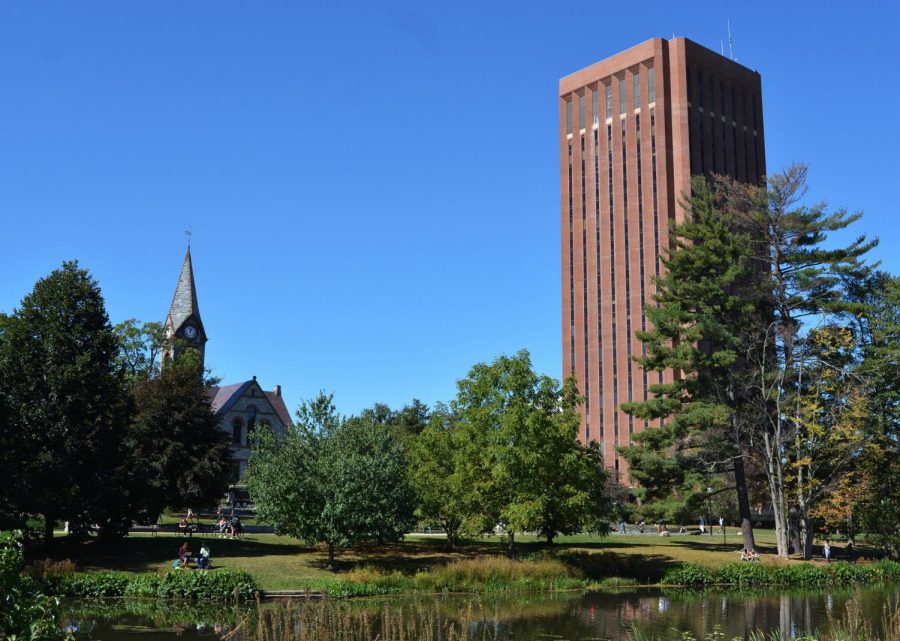Snowflakes, social media and self-selection bias were discussion points in the “Speech On and Off Campus” panel featuring The New Yorker staff writer and Columbia Journalism School professor Jelani Cobb on Tuesday at the University of Massachusetts.
The event, which was moderated by UMass Associate Chancellor for Equity and Inclusion and professor of sociology Anna Branch, was a part of the day-long symposium “Understanding the Forces that Drive Us Apart,” and aimed to better educate the community on the social and political polarization we are currently facing.
“College students are increasingly unwilling to tolerate hateful or protected speech. These are not simple times and there are no easy answers,” Branch said at the start of the event. “Now, more than ever, it is especially important that we foster an environment where we can exchange ideas, seek understanding and, at times, respectfully disagree.”
One of the topics Branch and Cobb discussed was the echo-chambers and polarization on Twitter and their impact on society.
Cobb started by talking about how social media symbolizes bigger issues and explained how even before social media existed, people followed social dynamics by clustering geographically, marrying within their faith and race and befriending those who are of similar social backgrounds.
“One of the things that social media does is amplify that,” he said.
Cobb then began discussing how 100 years ago, newspapers were openly partisan and you mainly read those you agreed with.
“If you were a Jew, that’s the newspaper that you read. If you were a Republican, that’s the newspaper you read. If you were a Democrat, if you were Italian, if you were Catholic….those newspapers oriented themselves to their readerships,” Cobb explained.
He went on to speak about how the plummeting faith in news media does not help this polarization.
“Humans tend to do this one thing, which is that we form what we think is a coherent world and… we have to organize information in a way that makes sense to us,” Cobb said, explaining how people have a selection bias and chose the information they want to hear.
“When people give you information that goes against that, what we tend to do is not change your world view but begin distrusting the person who gave you the information.”
Cobb used the example of a study from a few years ago in which informed white people that Black people are disproportionately arrested and disproportionately sentenced for the same thing white people have done.
“Their response tends to be more in favor of mass incarceration rather than ‘okay, there is something wrong here. There is something inconsistent.’ There’s ‘maybe these people did something else, there’s another aspect of this,’” Cobb said.
Another question Branch asked Cobb was how real interactions can be created and how we can have conversations with one another rather than simply co-existing.
“This is usually the plot twist when I talk about this subject — I don’t believe in safe spaces. Not at all,” Cobb said.
He used an anecdote of how he used to box and he particularly liked training and hitting the punching bag. He enjoyed hitting the bag hard and having it swing. When it came time to compete against someone, he noticed his opponent moving his hands strangely. It then occurred to him that his opponent was punching him in the face and that his hands were so fast, he was only seeing part of the motion.
“When we get into circles and we talk to only people who agree with us, you’re like I was [while boxing]. You are not only unprepared to engage with people who disagree with us, you’re unaware that you are unprepared to be with people who disagree with you,” Cobb said. “The end result is not education, but an arrogant ignorance and that is the enemy of education.”
Also during the talk, Cobb spoke about taking advantage of the different people you can converse with on a college campus, finding the line between hate speech and free speech and freely exchanging ideas while dealing with tension.
After an hour, Cobb took questions from the audience that filled roughly half of the Campus Center Auditorium.
Jonathon Pappas, a freshman majoring in political science, entered the latter half of Cobb’s discussion, but enjoyed the conversation and thought the symposium will help address the issue of free speech, among other issues the campus is facing.
“I respect that way he brought the Black perspective but he also looked at the other perspective and gave it like its fair share,” Pappas said. “So I think conversations like this are really what will help our University and our country come together more [rather] than divide because both sides are willing to look at both sides.”
Abigail Charpentier can be reached at [email protected] and followed on Twitter @abigailcharp.




















